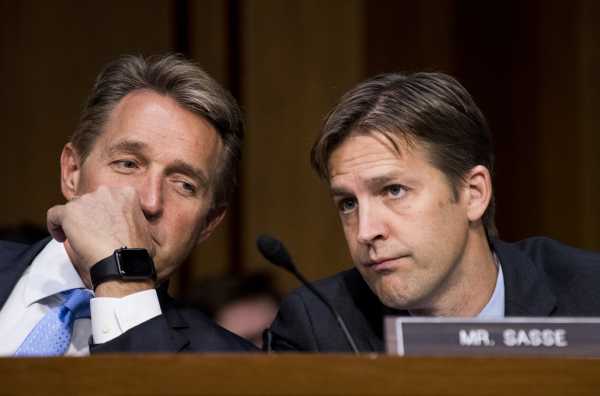
The week’s news has been dominated by two stories: Trump Supreme Court nominee Brett Kavanaugh’s confirmation hearings, and the New York Times’s anonymous op-ed from a Trump senior official blasting the president. These two things may seem unrelated, but they are not. Put together, they constitute a damning indictment of the way so-called “Never Trump” Republicans and their fellow travelers in Congress have reacted to a president who they know is unfit for office.
To see why, look at the way three Trump-skeptical Republicans in the Senate — Ben Sasse, Jeff Flake, and Bob Corker — have reacted to the Times op-ed, which argued that Trump has dangerous policy instincts and an erratic, moody personality (the same picture that emerges from Bob Woodward’s book and the past two years or so of inside-the-White House reporting). Sasse said the piece’s argument is “similar to what so many of us hear from senior people around the White House, you know, three times a week.” Flake said he was glad that members of Trump’s top staff, like the op-ed writer, are working to frustrate the president. Corker claimed that “this is what all of us have understood to be the situation from day one.”
But the question the Kavanaugh hearing prompted is this: What are they willing to do, as US senators, knowing that the president is unfit for office? The answer, it seems, is pretty much nothing.
Given that Republicans have only a 51-49 majority in the Senate, a mere two Republican defections could put Kavanaugh’s nomination in serious jeopardy (to a greater or lesser degree depending on where red-state Democrats, like West Virginia’s Joe Manchin, come down). Trump really wants Kavanaugh on the Court, and so does the rest of the party. This gives the three Trump-skeptical Republicans cited above a good deal of leverage over the president: the power to withhold their vote on a top Trump and GOP priority unless something is done to reel him in.
They could hold up the nomination until Trump agrees to sign a bill that would prevent him from firing special counsel Robert Mueller (such a bill has already passed the Senate Judiciary Committee). They could demand a passage of a bill restraining Trump’s ability to cavalierly launch a war (Senate Democrats have written such a bill). They could pass legislation preventing the president from unilaterally withdrawing from trade deals and international organizations like NATO (there is, you guessed it, a Senate bill for that).
They could demand real Senate investigations into Trump’s conflict of interests, or force him to release his tax returns — the list goes on and on and on.
But the Sasse-Corker-Flake triumvirate hasn’t done any of that. They haven’t even hinted at doing anything like that, despite the obviousness of such a move given that the op-ed prompted focus on Trump’s fitness for office. According to the Vox Senate confirmation tracker, both Sasse and Corker have already voiced support for Kavanaugh’s nomination; Flake is still formally undecided but widely expected to vote yes.
By prioritizing their party’s interests over their duty to act in a crisis that they have acknowledged we’re confronting, the Trump skeptics in the GOP expose their own rhetoric as profoundly hollow.
If this is a crisis, act like it
This isn’t the first time these Republicans have acted like this. Time after time, on issue after issue, Sasse, Corker, and Flake have all voiced criticisms of Trump and then voted for his legislation when the time comes. There has never been any concerted effort to use their leverage to hold Trump accountable, or try to mitigate the consequences of a venal and mercurial man holding the most powerful position in the world.
But there has never been a clearer contrast between what these Republicans say and what they do than there is at this particular moment in time. The two main topics in American public life at the moment are the Supreme Court and the basic unfitness of the president for office. Yet in the name of the former, Republican legislators aren’t acting to do anything about the latter.
If the crisis is as bad as the anonymous Times op-ed writer and these senators say it is, then this isn’t a time for the normal politics of judicial confirmation. It’s a time to subordinate everything to the health and survival of the country: protecting American democracy, and blocking Trump from using his policy powers to endanger national security and the health of the US economy.
And yet confirming Kavanaugh comes first. Tax cuts came first. The Obamacare repeal effort, which all of these men supported, came first. There never seems to be a time when the actual power these men have — the power to block Trump’s legislative priorities — is being used.
Some anti-Trump conservatives think this is the principled thing to do. Commentary’s Noah Rothman, for example, argues that it would be inconsistent or unprincipled for Republicans to put Kavanaugh below combating Trump:
But this has it precisely backward. Voting for Kavanaugh unconditionally is valuing power, GOP control on the Supreme Court, over consistency — consistency with their own stated view of the gravity of the crisis facing the country.
These three senators, if you ask them, would claim to put country over party. But when they warn that the basic health of the country is at stake, and have an opportunity to do something about it, Republican political and policy interests come first.
This is the core of the problem. Republicans, even the ones who are willing to open their eyes to the danger of Trump, think that tax cuts and judges are more important than reining in a president who they fully admit could do serious damage to the country. If even the most Trump-skeptical Republicans are unwilling to entertain the idea of temporarily frustrating the Republican agenda in order to rein in Trump, what hope is there for the rest of the party?
Sourse: vox.com






